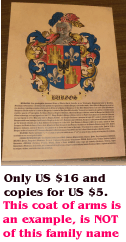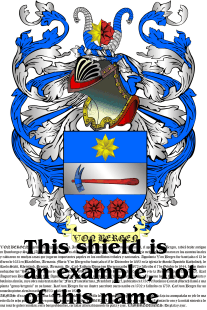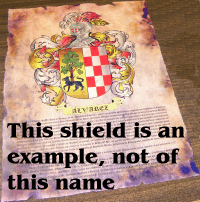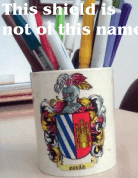
Parchment with the coat of arms, origin and history for the family name Aesinga. Very cheap.

Coat of arms for Aesinga and the history and origin for the family name Aesinga in JPG or Vectorial files as Corel-Draw, AI, WMF, etc.
The coats of arms and family crests with meaning for the family name Aesinga are collected in the Armorial General by Johan Baptiste Rietstap, this work is the greatest work of heraldry ever written and drawn, with more than 100,000 family names from around the world (English, Scotish, Welsh, Spanish, French, Italians, Poles, Portuguese, Dutch, etc.), among which is the name Aesinga, arranged alphabetically, and DRAWN, including a heraldic handbook with drawings, a complete glossary of terms, a supplement and an appendix. Complete description the coat of arms Aesinga, and origin for the family name Aesinga, nobiliary titles of the family name Aesinga and of the concession dates. The text where the family name Aesinga appears is in the second edition, expanded and revised from 1884-1887.
The family crest and coat of arms of Aesinga appears in Rietstap Armorial General that is a multi-volume work on the coats-of-arms of the world; it is both monumental and without equal, and is the most exhaustive undertaking of its kind. The Armorial General is the most authoritative work on the coats-of-arms in the world. The descriptions of the arms cover those of more than 100,000 families, included Aesinga alphabetically arranged and accurately described.In addition to a full description of the arms for Aesinga, most entries identify the nationality of the arms bearer, titles of Aesinga, and the date his title was conferred. The basic text was established with the publication of the second edition, corrected and enlarged, of 1884-1887. This most important reference work contains the shields of thousands of Coats of Arms covering the whole world, arranged alphabetically under surnames, as Aesinga.One of the most distinctive qualities of heraldry is the use of a limited palette of colours and patterns, usually referred to as tinctures. These are divided into three categories, known as metals, colours, and furs.
Next we are going to see the meanings of three tinctures:
1) ARGENT (Silver): Purity, Integrity, Obedience, Firmness, Surveillance, Eloquence and Expiration.
2) OR (Gold): Nobility, Magnanimity, Wealth, Power, Light, Constancy and Wisdom.
3) GULES: Red color that symbolizes Strength, Victory, Daring and Highness.
Next lets look at the characteristics of some figures that we can find in heraldry and crests:
* AXE: The Axe symbolizes Death caused to the enemy, and also an ax or wick to illuminate.
* SUN: The Sun is a symbol of Sovereigns and Kings, those who with their power vivify the entire State; It is an emblem of Eternity, Greatness, Power, Providence, Illustrious Nobility and Magnificence.
* CHECKY: The Checky symbolizes Military Art, for which reason it is usually awarded to soldiers who have exposed their lives in combat.
* HEART: The Heart is a symbol of Vigilant Vassal. In its fiery color, it demonstrates Warmth of mind and loving expression of Affection.
* PALM: The Palm Tree symbolizes Victory and Triumph.
* CHEVRON: The Chevron symbolizes the boots and spurs, and for this reason it was granted as an adornment of the shield to the Knight who was wounded from the combat in his legs.
* STAG: The Stag symbolizes Effortless Courage, which draws and recovers energy even on the most adverse occasions.
* WALL: The Wall represents the Noble Heart of the Knight, in which no betrayal or disloyalty can enter.
* The family name Aesinga appears in the list of last names of Heraldry & Crests so its complete history, crest and coat of arms or heraldic shields can be known on his website: http://www.heraldrycrests.com/
Heraldry for family name Aesinga as well as its history is at your disposal here: Heraldry, history, origin, crest and coat of arms of the family name Aesinga
Related Words: Aesinga family crest | Origin of the name Aesinga | Genealogy of the family Aesinga | Heraldry of the name Aesinga | Coat of arms of Aesinga | Genealogy of the Aesinga | Origin of the Aesinga | Meaning of the name Aesinga.

Images of some books referred, with information of the family name Aesinga:

All the information about the surnames that are collected in this web site are based on verified bibliography.
Origin of family name, history and coat of arms/crests

